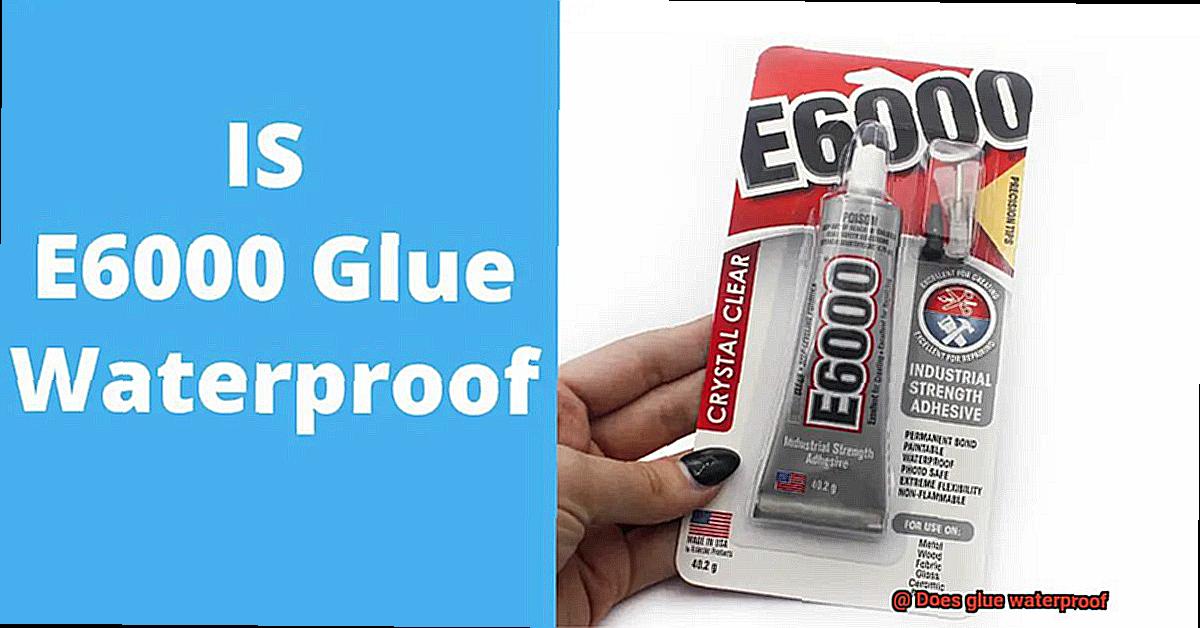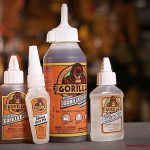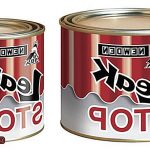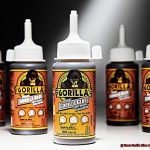Buckle up for a wild ride as we embark on a thrilling journey into the captivating realm of waterproofing. Ever pondered whether glue has what it takes to battle against the relentless forces of water? Today, we’re diving headfirst into this mind-boggling question to uncover the hidden secrets behind glue’s superpower as a waterproofing agent.
Sure, glue may seem like an ordinary tool, just sticking things together and fixing odds and ends. But hold your horses, because there’s more to this sticky substance than meets the eye. Brace yourself for a revelation – glue has the potential to transform everyday objects into water-resistant wonders. From nifty DIY projects to those pesky household repairs, understanding how glue can handle water might just revolutionize your crafting game.
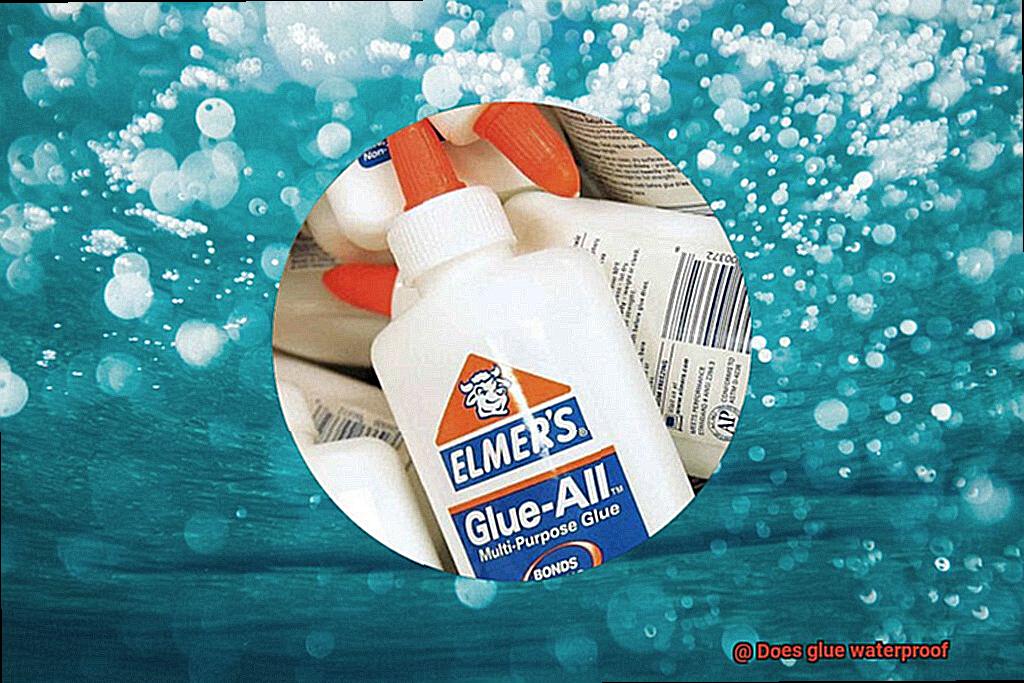
In this blog post, we’re unraveling the ABCs of waterproofing with glue. We’ll dig deep into its scientific wizardry and shine a light on the types of glue that truly stand tall against watery foes. So grab your favorite mug filled with steaming coffee, get cozy, and prepare to embark on an exhilarating adventure through the mesmerizing world of glue’s waterproofing prowess. Let’s dive right in.
What is Glue?
Contents
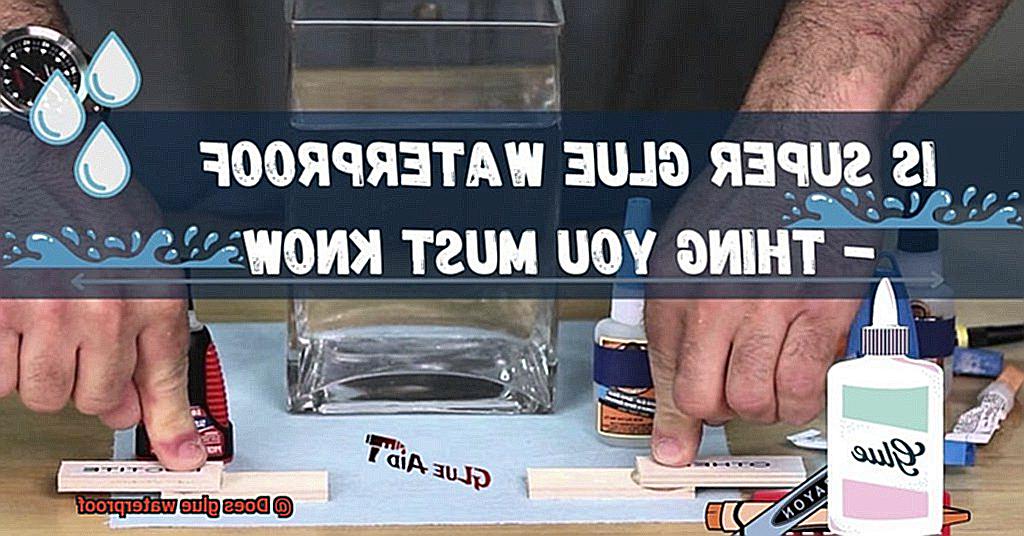
Glue, that mystical substance that has the power to bring surfaces together, comes in a myriad of types, each with its own unique properties. Among the many questions that arise when exploring the world of glue, one stands out: is glue waterproof? In this article, we will embark on a journey to uncover the secrets of glue, delving into its various types and their waterproofing capabilities. Get ready to unravel the science behind this remarkable adhesive.
Types of Glue:
- Adhesive glue: This versatile glue is commonly used for general purposes but is not typically waterproof. While it may resist some moisture, it is not suited for long-term exposure to water or extreme conditions.
- Super glue (cyanoacrylate adhesive): Super glue, with its instant bonding power, is not inherently waterproof. However, specialized variants have been engineered with water-resistant properties, providing a stronger bond even in wet conditions.
- Epoxy glue: Known for its exceptional waterproofing capabilities, epoxy glue consists of two components that must be mixed together before application. Once cured, epoxy forms an unyielding bond that is highly resistant to water and moisture.
Limitations and Considerations:
- Duration and submersion: Even with waterproof glues, prolonged submersion in water may gradually weaken the bond over time. Therefore, it’s essential to consider the intended use and duration of exposure when selecting a waterproof glue.
- Extreme temperature variations: Glues can also be impacted by extreme temperature changes, which may affect their ability to remain waterproof. Familiarizing yourself with the suitable temperature range for a specific type of glue ensures a reliable bond.
Surface Preparation:
To optimize the waterproofing properties of glue, meticulous surface preparation is crucial. This involves thorough cleaning of the surfaces to be bonded, removing any dirt, grease, or moisture that could hinder the glue’s effectiveness. Following the manufacturer’s instructions precisely is key to achieving optimal bonding results.
Choosing the Right Glue:
When faced with the task of selecting a glue for waterproof applications, consider factors such as the materials being bonded and the intended use of the items. Understanding the limitations and capabilities of different glue types empowers you to make informed decisions.
Types of Glue
Choosing the right glue for your project requires understanding its waterproof properties. In this article, we will explore the various types of glue available on the market and their varying levels of water resistance. Whether you are working on a DIY repair or a craft project, knowing which glue to use can make all the difference.
Epoxy Glue: The Unyielding Bond
Epoxy glue is a heavyweight champion in the world of waterproof adhesives. Composed of two components – a resin and a hardener – epoxy creates an incredibly strong and durable bond. Once cured, it can withstand exposure to moisture, chemicals, and extreme temperatures. From boat repairs to metal bonding, epoxy glue is your go-to for watertight and long-lasting results.
Polyurethane Glue: Versatility Meets Water Resistance
Polyurethane glue, or PU glue, is a versatile adhesive that offers excellent water resistance. It can bond a wide range of materials, including wood, metal, plastic, and glass. Once cured, polyurethane glue forms a strong and flexible bond that remains unaffected by water or moisture. Whether you’re repairing outdoor furniture or constructing a wooden deck, PU glue has got your back.
Silicone Glue: The Watertight Wonder
Silicone glue is perfect for sealing gaps and joints with precision. Whether in the form of sealants or adhesives, silicone creates a flexible and watertight seal when applied between two surfaces. It is ideal for plumbing fixtures, windows, or even glass tanks.
Cyanoacrylate Glue: The Water-Resistant Warrior
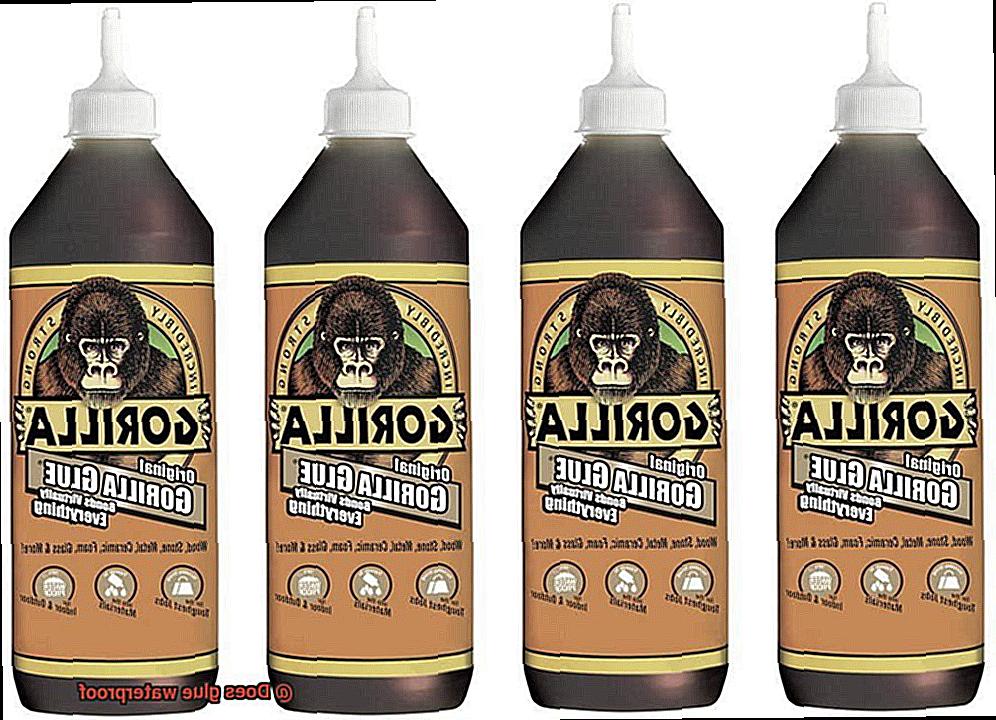
While not all cyanoacrylate glues are inherently waterproof, there are specialized variants available that offer water-resistant properties. These “waterproof” or “water-resistant” cyanoacrylate glues provide a reliable bond even in wet or humid conditions. Just check the product label before use to ensure you’ve got the right variant for your needs.
PVA Glue: The Water-Resistant Craftsman
PVA glue, commonly used in crafts and woodworking projects, is not inherently waterproof. However, specialized PVA variants offer water-resistant properties. They can withstand a certain level of moisture, making them suitable for outdoor furniture assembly or bonding wood in high humidity environments.
Adhesive Glue and Waterproofing
In this article, we will dive into the world of adhesive glues and explore how they can be used for waterproofing purposes.
Epoxy Glue: The Unyielding Bond
Epoxy glues are renowned for their exceptional waterproofing capabilities. These glues create a strong and unbreakable bond that can withstand exposure to water, chemicals, and extreme temperatures. Whether you’re repairing a leaky pipe or building a boat, epoxy glue is your best friend in creating a watertight seal.
Polyurethane Glue: Versatile and Water-Resistant
Polyurethane glues offer excellent water resistance and versatility. They are suitable for both indoor and outdoor applications, making them ideal for projects that require exposure to moisture. From bonding wooden furniture to fixing outdoor structures, polyurethane glue ensures a reliable bond even in damp conditions.
Silicone-Based Glue: Sealing with Precision
If you’re looking for a glue that excels in sealing gaps and joints, silicone-based glue is your answer. These glues are highly water-resistant and are commonly used in wet areas like bathrooms and kitchens. Silicone-based glues create a flexible and durable bond that can withstand constant exposure to water without compromising its integrity.
Cyanoacrylate Glue: Reliable Water Resistance
While not inherently waterproof, certain cyanoacrylate glues provide reliable water-resistant properties. They can resist small amounts of moisture without compromising the bond strength. However, it’s important to note that prolonged exposure to water may weaken the bond over time.
Surface Preparation Matters
Regardless of the type of adhesive glue you choose for waterproofing purposes, proper surface preparation is crucial. Make sure to clean, dry, and roughen the surfaces that need to be bonded. This will enhance the adhesive’s ability to create a strong and long-lasting waterproof seal.
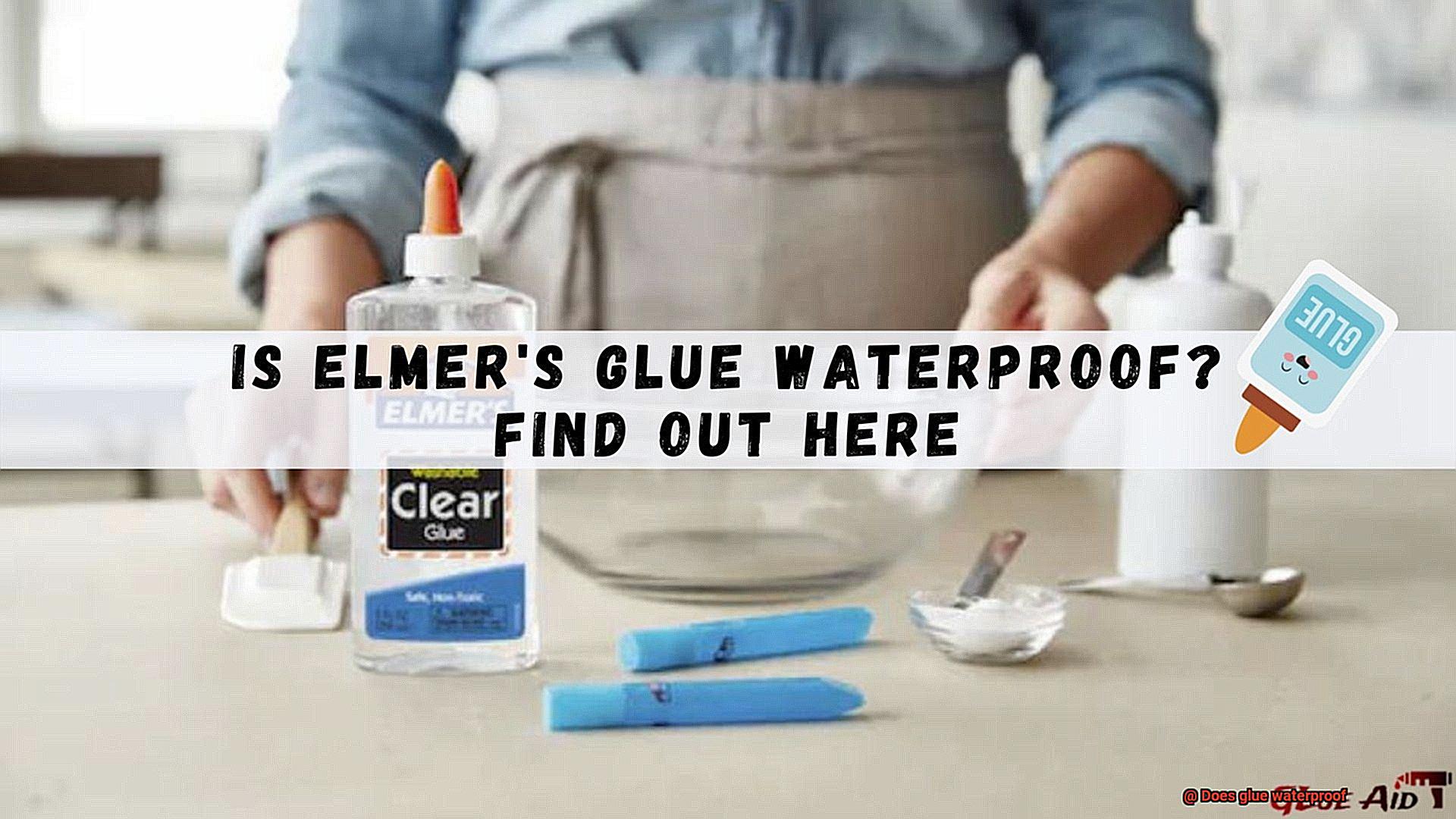
Super Glue and Waterproofing
Look no further than the world of adhesive glues, where you’ll find a wide range of options that can transform into your best friend when it comes to creating watertight seals.
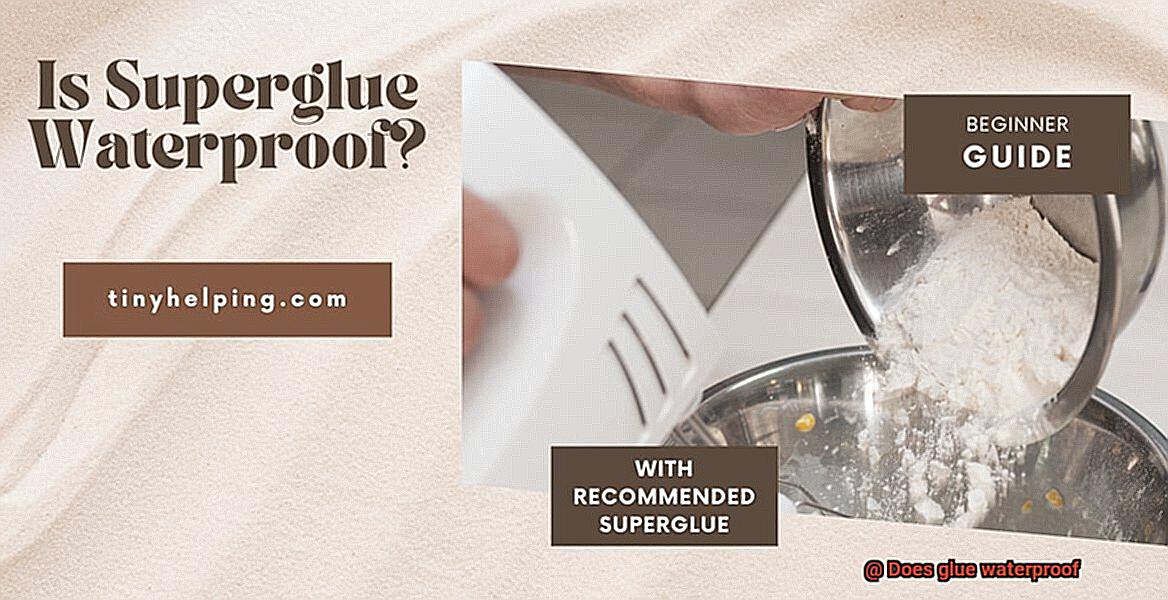
Let’s start with epoxy glue, a true powerhouse in the world of adhesives. Known for its unyielding bond, epoxy glue is a go-to choice for projects that require a strong and durable waterproof seal. Whether you’re fixing a leaky pipe or building a boat, epoxy glue has got your back. Its ability to create an unbreakable bond even underwater makes it a top contender for any water-related project.
If you find yourself working in damp conditions, such as a basement or a humid environment, polyurethane glue is the answer. This versatile adhesive excels in moisture-rich areas and ensures reliable bonds even when faced with challenging conditions. So, no matter how damp or humid your workspace may be, polyurethane glue will help you achieve the watertight seal you need.
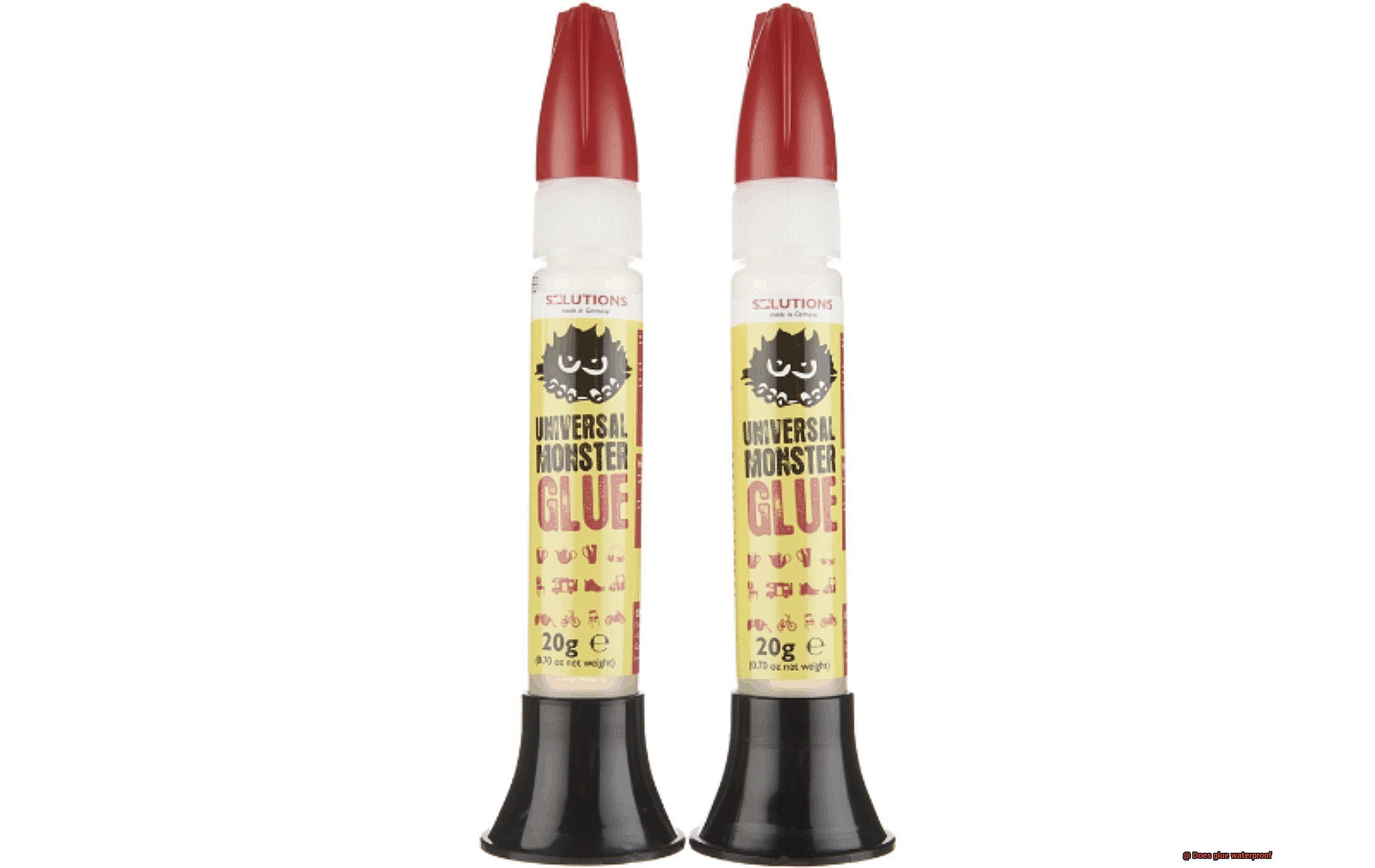
For sealing gaps and joints in wet areas like bathrooms and kitchens, silicone-based glue is the way to go. This incredible adhesive not only creates a strong bond but also remains flexible, allowing for natural expansion and contraction. Say goodbye to pesky leaks and hello to a waterproof seal that will stand the test of time.
Now, let’s talk about everyone’s favorite adhesive: super glue. While super glue is not inherently waterproof, certain types of super glues are specifically designed to be more resistant to moisture. These specialized variants, often labeled as “water-resistant” or “waterproof” super glues, contain additives or chemical compounds that enhance their ability to withstand exposure to water. Keep in mind that their effectiveness can vary depending on factors such as the material being bonded and the duration of water exposure.
To further enhance the waterproofing capabilities of super glue, you can consider applying a thin layer of silicone sealant over the bonded area. Silicone sealants are highly water-resistant and provide an extra layer of protection against moisture. By combining the power of super glue with the reliability of silicone sealant, you can create a more durable and waterproof bond that will withstand even the toughest water-related challenges.
Epoxy Glue and Waterproofing
When it comes to waterproofing, epoxy glue is the superhero you need in your toolbox. Its incredible bonding properties and resistance to water make it an essential adhesive for a wide range of applications. Whether you’re fixing leaky pipes, sealing cracks, or working on wet surfaces like boats or aquariums, epoxy glue is your go-to solution for watertight protection.
The Science Behind Epoxy Glue’s Waterproofing Abilities:
Epoxy glue’s secret lies in its chemical composition and curing process. Composed of two components – resin and hardener – it creates a formidable bond when mixed in equal proportions. This mixture undergoes a chemical reaction that forms a cross-linked polymer network, rendering it highly resistant to water penetration. Say goodbye to worries about water damage or leaks.
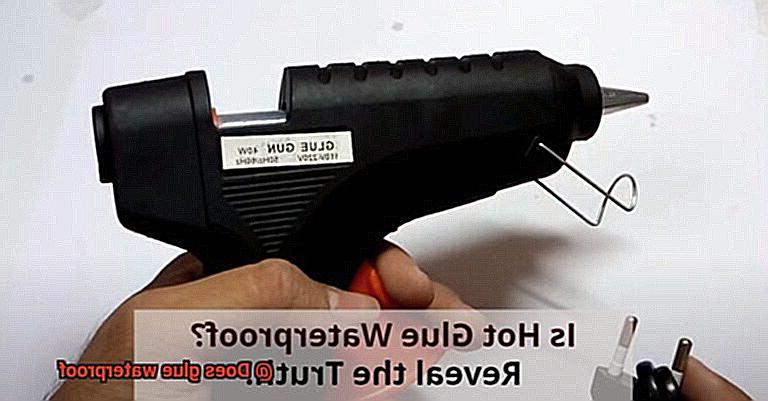
Benefits Beyond Waterproofing:
In addition to its exceptional waterproofing capabilities, epoxy glue offers more. Its exceptional strength ensures a durable and long-lasting bond, providing peace of mind that your repairs or projects will withstand the test of time. Furthermore, its excellent adhesion properties make it compatible with a wide range of materials, from concrete to metal and everything in between.
Versatility and Application Techniques:
Different brands and formulations of epoxy glues may offer varying degrees of water resistance. Therefore, it’s important to select the appropriate epoxy glue for your specific needs. By carefully following the manufacturer’s instructions, you can achieve optimal results. Proper surface preparation, even application, and sufficient curing time are critical steps to ensure maximum effectiveness.
Special Considerations:
While epoxy glue excels in most waterproofing applications, there are instances where specialized products may be more suitable. Constant submersion in water or exposure to extreme conditions may necessitate the use of marine-grade sealants or coatings. It’s important to assess your specific requirements and select the appropriate product accordingly.
Limitations of Waterproof Glues
When it comes to waterproofing your projects, epoxy glue seems like the ultimate superhero. Its ability to resist water and create a watertight seal is impressive, making it a popular choice for a variety of applications. However, even this mighty adhesive has its limitations. In this article, we’ll explore the various limitations of waterproof glues, so you can make informed decisions when selecting the right adhesive for your needs.
Material Compatibility:
Not all waterproof glues are created equal—they’re like superheroes with specific powers. Some may excel at adhering to surfaces like metal or glass, but struggle with wood or plastic. Choosing a glue specifically formulated for the material you’re working with is crucial for achieving a strong bond that withstands the test of time.
Diminished Effectiveness Over Time:
Continuous exposure to water, heat, or humidity can weaken the once invincible bond created by waterproof glues, leading to eventual failure. This Achilles’ heel is particularly concerning in applications where long-term durability is required, such as outdoor or marine environments where constant exposure to water is inevitable.
Limited Flexibility:
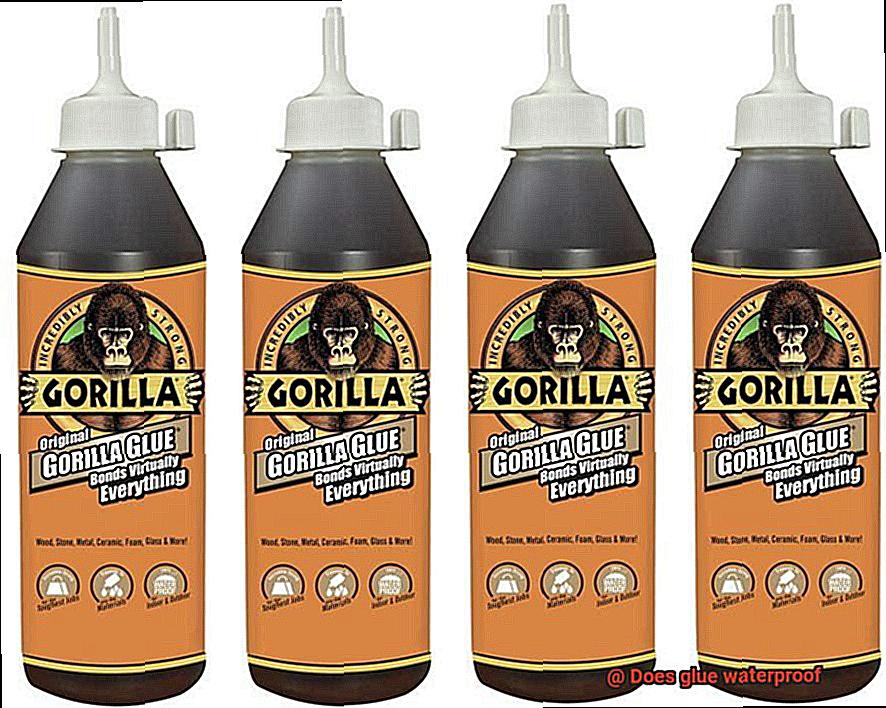
While these glues may be powerful, they can also be inflexible. Just like a superhero with limited agility, some waterproof glues dry to become brittle or stiff. This rigidity poses problems when flexibility is necessary, as glued joints that need to move or bend may crack or break under pressure instead of accommodating the movement gracefully.
Limited Resistance to Chemicals/Solvents:
Even superheroes have their kryptonite—certain types of waterproof glues may not have sufficient resistance to chemicals or solvents. Contact with substances like oil, gasoline, or cleaning agents can weaken the glue’s grip and compromise its waterproof properties. It’s essential to consider the potential exposure of your project to these substances before selecting a waterproof glue.
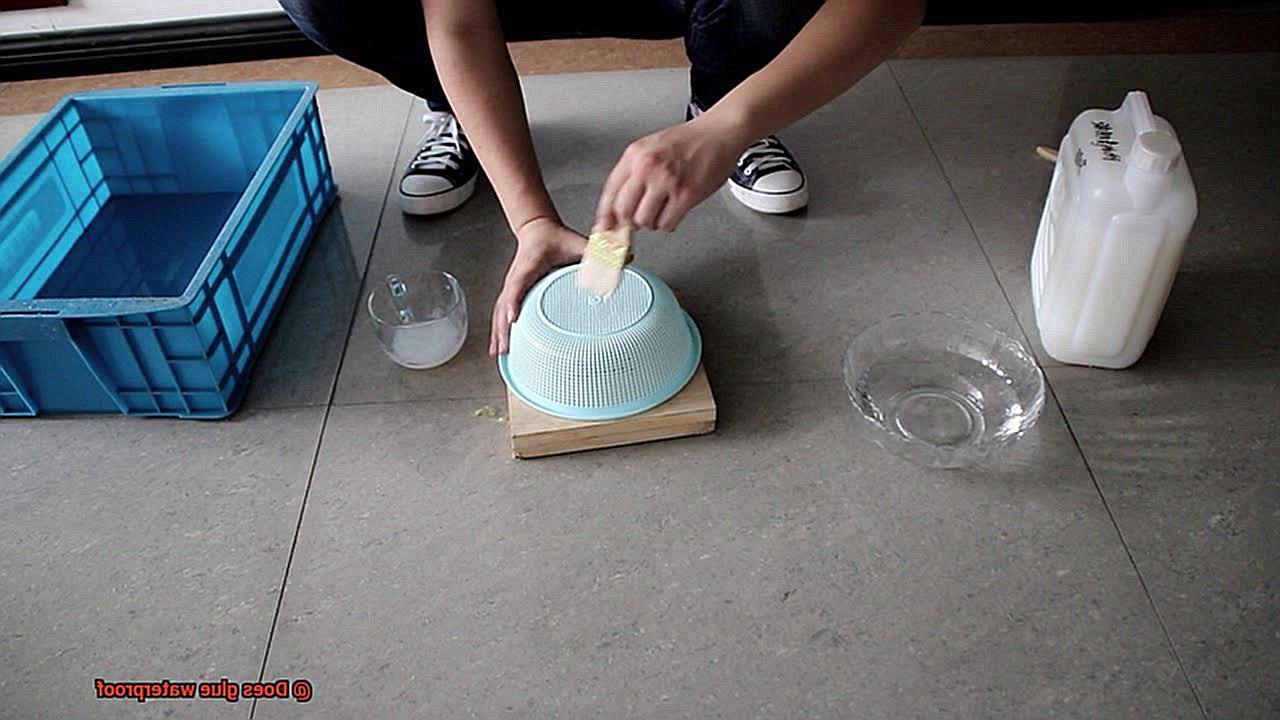
Partial Water Penetration:
Although waterproof glues are designed to repel water like a shield, prolonged exposure or submersion can still result in some level of penetration or damage to the bond created by the glue. While they offer excellent resistance against water and moisture, they aren’t invincible, and their protective powers have limits.
Complex Application Process:
Becoming a master at using waterproof glues requires more than just super strength. These glues often demand specific surface preparation for optimal adhesion, such as cleaning or roughening surfaces to enhance their grip. Additionally, some glues have specific curing or drying requirements, such as needing a certain temperature or humidity level for their powers to activate fully.
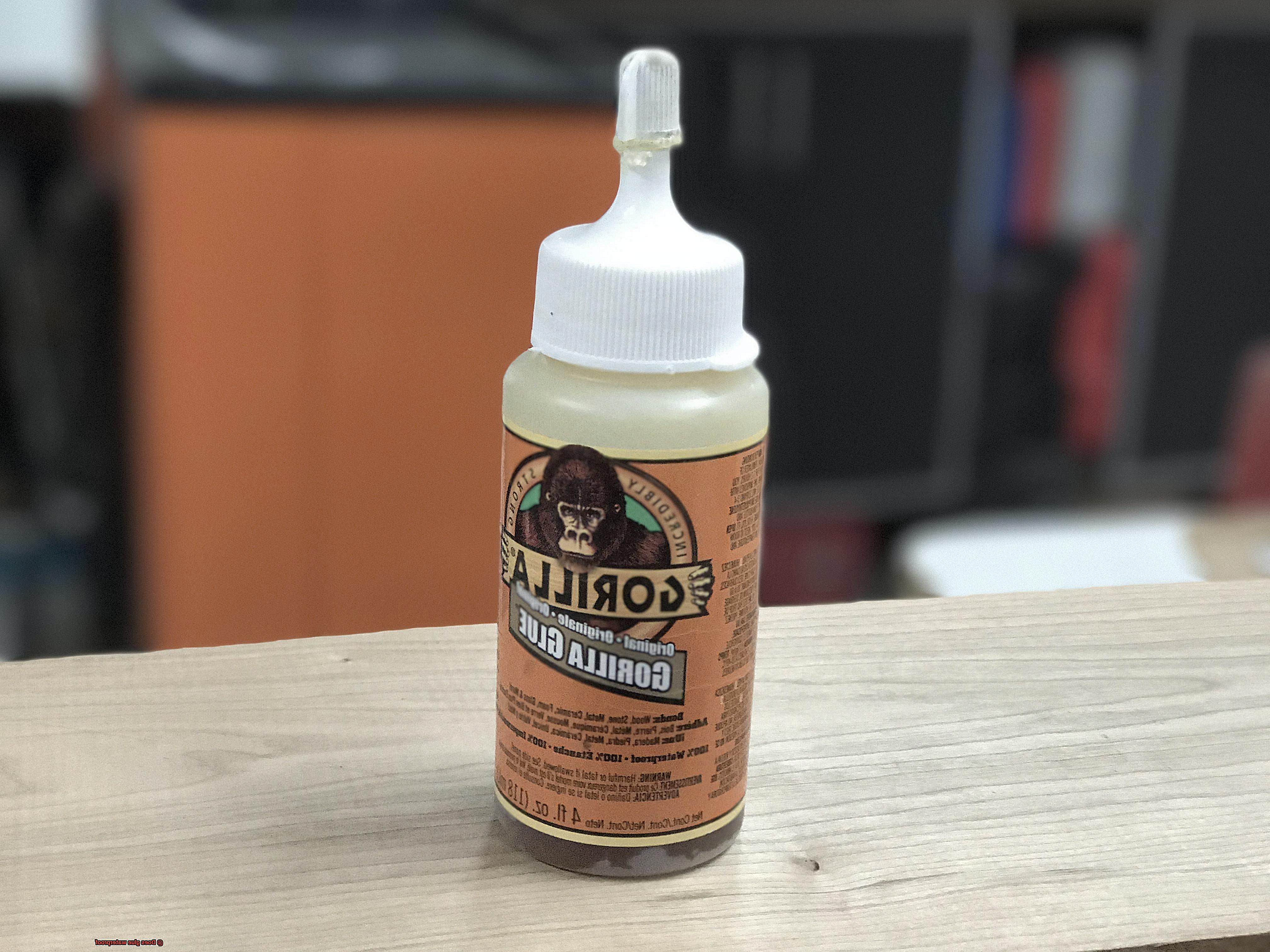
Enhancing the Waterproofing Properties of Glue
We’re here to spill the secrets on how to transform your glue into a water-resistant superhero that can conquer any sticky situation.
The Science Behind It
Glue, in its natural state, is like a thirsty sponge that soaks up water, losing its adhesive powers faster than a superhero loses their cape in a gust of wind. But fear not, we’re about to change that.
The Magical Additives
To turn your average glue into a water-resistant champion, you need some special ingredients. Enter the waterproofing agents. These wonders create a protective shield around the glue, preventing water from sabotaging its adhesive strength. Just mix them with your favorite glue and witness the transformation.
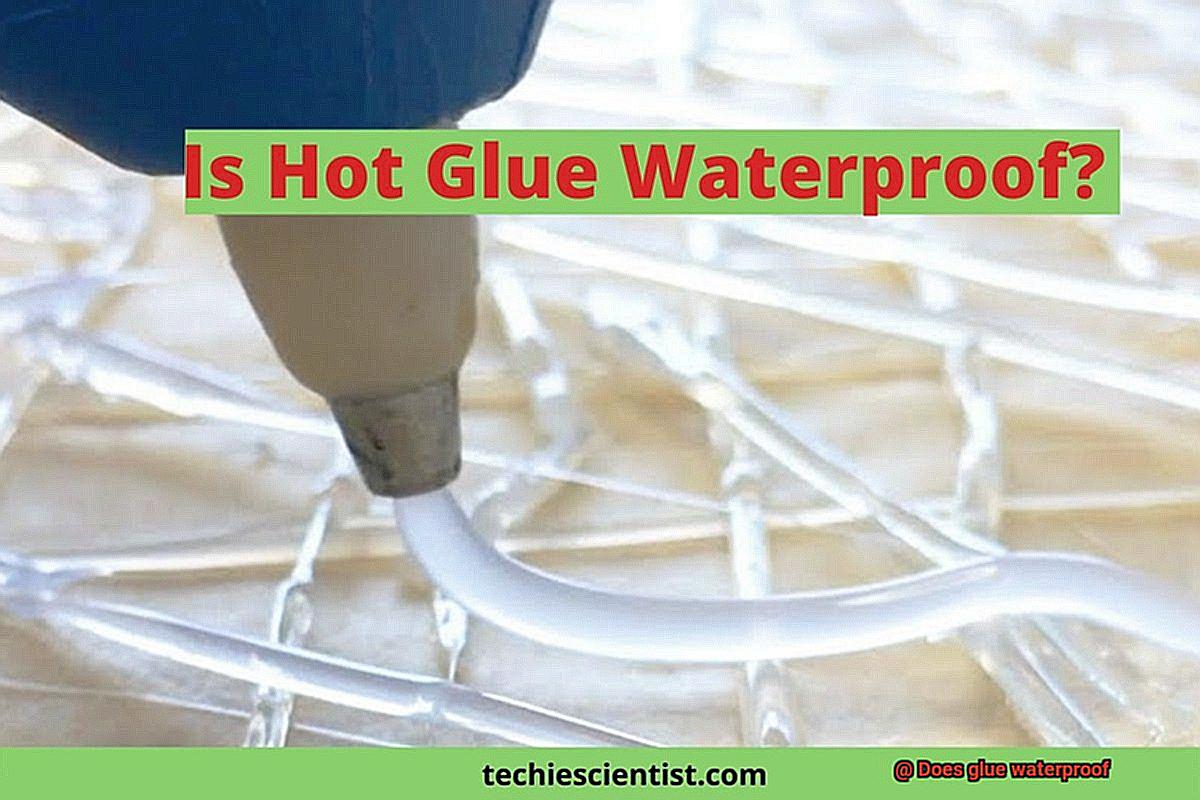
A Double Shield
Let’s double down on waterproofing. Introducing the waterproof sealant or coating. By adding this extra layer over your glued surface, you create an impenetrable barrier against water infiltration. This not only reinforces the bond but also ensures your masterpiece remains intact even in wet conditions.
Choosing the Right Glue
While additives and sealants work wonders, choosing the right glue is crucial. Many manufacturers offer specialized waterproof glues designed to withstand water exposure. So, read those labels and pick the glue that’s ready to take on the elements.
The Final Touches
Almost there. But remember these essential tips. Follow the manufacturer’s instructions when using additives or coatings. Too much of a good thing can be detrimental. Also, consider the material you’re working with and its compatibility with water. Some materials may react poorly to moisture, so additional measures like waterproof tapes or sealants might be necessary.
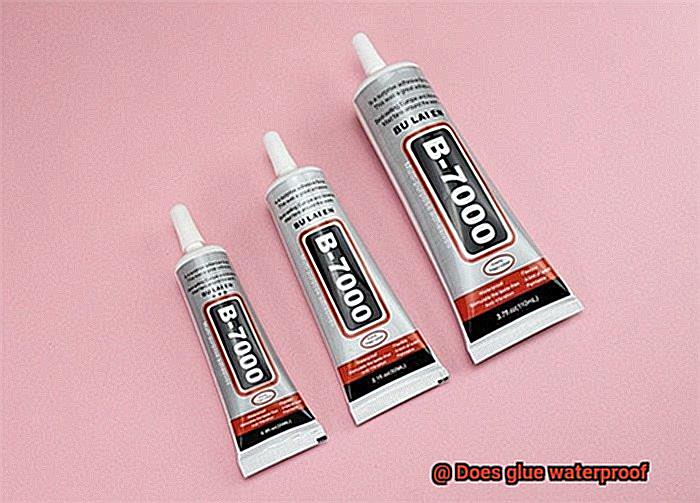
Factors that Impact the Overall Waterproofing Capability of Glue
When it comes to selecting the right glue for your project, considering its waterproofing capabilities is crucial. Whether you’re working on crafts, construction, or repairs, having a glue that can withstand moisture is vital. In this blog post, we will delve into the factors that impact the overall waterproofing capability of glue and unlock the secrets behind its superpowers.
Type of Glue: The Heroic Choice
Different glues possess varying levels of waterproofing capabilities. Epoxy or polyurethane-based glues are like specialized superheroes designed to repel water with ease. They create a tight bond that prevents any damage caused by moisture. However, traditional white glue or wood glue may require additional measures to enhance their water resistance.
Composition: The Magical Formula
The composition of the glue holds the key to its waterproofing powers. Waterproof glues contain special additives like resins, solvents, or cross-linking agents that create an impenetrable bond. The higher the percentage of these additives, the better the glue’s ability to resist water.
Application Method: The Art of Bonding
The way you apply glue impacts its waterproofing capabilities. Ensuring complete coverage between surfaces and applying multiple coats can enhance its ability to repel water effectively. So, be sure to apply an even layer of glue and let it work its magic.
Surface Preparation: Creating the Perfect Canvas
Before unleashing your glue’s superpowers, proper surface preparation is crucial. Clean, dry surfaces free from contaminants or oils provide a solid foundation for a strong bond. By roughening the surface with sandpaper or using a primer, you enhance the adhesive’s grip and improve its water resistance.
Environmental Factors: Facing Adversities
Just like any superhero, your glue will face environmental challenges. Temperature fluctuations, humidity levels, and exposure to UV radiation can impact its performance over time. Consider the specific requirements of your project and choose a glue that is resistant to these factors.
Cure Time: From Novice to Hero
Some glues offer initial water resistance, but their full waterproofing capabilities may only be realized once they have fully cured. Patience is key. Follow the manufacturer’s instructions regarding cure time for optimal results.
Maintenance and Care: The Secret to Longevity
To ensure your glued objects maintain their waterproofing capabilities, regular maintenance and care are essential. Clean them regularly, avoid prolonged exposure to water, and promptly address any damage or wear. By doing so, you’ll preserve the integrity of the adhesive bond and enjoy long-lasting waterproofing.
Conclusion
In conclusion, it is important to understand that glue itself is not inherently waterproof.
While some types of glue may have water-resistant properties, they are not completely impervious to water. It is crucial to choose the right type of glue for your specific needs, such as using waterproof or water-resistant glue for projects that will be exposed to moisture.
Additionally, proper application and drying time are essential factors in ensuring the effectiveness of the glue’s water-resistance.

